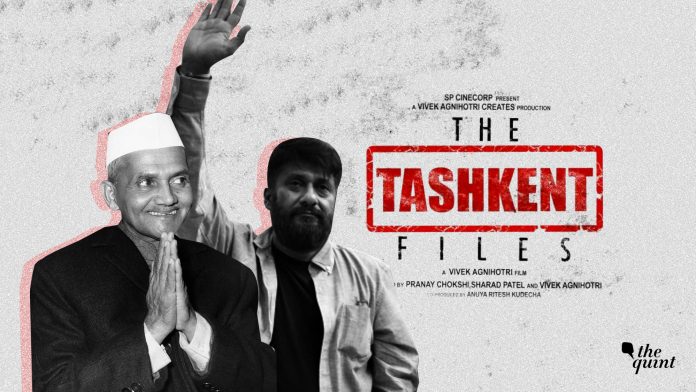Zee Studios, Vivek Agnihotri Creates and SP Cinecorp’s The Tashkent Files (UA) is the story about the mysterious death of India’s second prime minister, Lal Bahadur Shastri, in Tashkent in 1966.
Lal Bahadur Shastri had gone to Tashkent in January 1966 to sign the Tashkent agreement with Pakistan, after defeating the neighbouring country in the Indo-Pak war of 1965. Soon after signing the agreement, the Indian prime minister died under mysterious circumstances in his hotel room in Tashkent.
The ruling party then dubbed his death as being due to natural causes. There was no post-mortem done, and no enquiry committee was set up to probe the sudden and untimely demise even though the dead person was none other than the country’s prime minister.
Decades later, a journalist, Raagini Phule (Shweta Basu Prasad), gets a call from an unknown number on her cellphone, telling her that she would soon hit upon the scoop story of her life. Thus far, Raagini has been known for her fake and created stories.
Sure enough, there’s a large envelope in her drawer in the office, and inside the envelope are proofs that Lal Bahadur Shastri’s death in 1966 may not have been due to natural causes. Raagini writes the story in the newspaper she is working for and raises questions about why the truth was not probed then. This opens a Pandora’s Box.
An enquiry committee is set up under the chairmanship of politician Shyam Sundar Tripathi (Mithun Chakraborty). The committee has as its members RAW chief G.K. Ananthasuresh (Prakash Belawadi), historian Aiysha Ali Shah (Pallavi Joshi), socialite Indira Joseph Roy (Mandira Bedi), businessman Omkar Kashyap (Rajesh Sharma), retired judge Kurien Abraham (Vishwa Mohan Badola), Gangaram Jha (Pankaj Tripathi) and Vishvendra Pratap Singh Rana (Prashant Gupta). Shyam Sundar Tripathi also takes Raagini on the committee.
The nine-member committee begins discussing whether there was a scandal that was swept under the carpet in the case of Shastri’s death. The arguments often turn ugly. Meanwhile, Raagini continues to get the telephone calls from the unknown caller, informing her about where she can find more material to substantiate her theory that a lot had been hidden from the public about the cause of Shastri’s death. Having lost her job, Raagini spends her own money to go to Tashkent and meet Mukhtar (Vinay Pathak) for more details. Even as arguments are put forth everyday in the committee meetings, Raagini meets a witness (Yusuf Hussain) who is to depose before the committee. This goes against Raagini as she is deemed to have tried to influence the witness who, incidentally dies in a road accident a few seconds after his meeting with Raagini. Obviously, Raagini is asked to leave the committee.
Raagini, convinced that she is on the right track, now seeks Shyam Sundar Tripathi’s permission to present her theory as a witness before the committee. Is she permitted? Does she have enough incriminating evidence to substantiate her theory? What is the finding of the committee?
Vivek Ranjan Agnihotri has written a story from history books and has researched it excellently. Although the story dates back to 1965-66, it is intriguing and exciting. His screenplay is fast-paced and keeps throwing up turns and twists pretty fast. However, there is too much technical jargon used, which would not be understood easily except by the class audience. No doubt, this may not interfere completely in the comprehension of the drama by the viewers but it will put off the masses and family audiences. As such, the interesting and engrossing drama would remain as one for the elite audience only. Since the drama ends without a final verdict, the audiences may feel cheated because they are used to a climax of finality. Vivek Ranjan Agnihotri’s dialogues are lovely.
Mithun Chakraborty excels in the role of Shyam Sundar Tripathi. His emotional outburst is supremely effective. Shweta Basu Prasad is fantastic as Raagini Phule. She does such a splendid job that she makes her character extremely likeable. The girl has a lot of fire in her. Pallavi Joshi is outstanding as historian Aiysha Ali Shah. Mandira Bedi does a fine job as Indira Joseph Roy. Rajesh Sharma is effective as Omkar Kashyap. Pankaj Tripathi is wonderfully natural as Gangaram Jha. Prakash Belawadi is terrific as G.K. Ananthasuresh. Prashant Gupta leaves a mark as Vishvendra Pratap Singh Rana. Vishwa Mohan Badola makes his presence felt as retired judge Kurien Abraham. Naseeruddin Shah is lovely in the role of minister Natarajan. Vinay Pathak is restrained in the role of Mukhtar. Asif Basra is very natural as Raagini’s boss. Yusuf Hussain is good. Ankur Rathee (as Imran Qureshi), Achint Kaur (as wife of Natarajan), Vikas Mohla (as PA of Shyam Sundar Tripathi) and the others provide good support.
Like his research and script, Vivek Ranjan Agnihotri’s direction is also praiseworthy. However, it must be added that the style of narration holds appeal only for the classes rather than being universally appealing. Rohit Sharma’s music is good but completely functional and devoid of popular songs. Aazad’s lyrics are okay. Satya Malik Afsar’s background music is impactful. Uday Singh Mohite’s camerawork is spendid. Uday Prakash Singh’s production designing is appropriate. Satyajit Gazmer’s editing is sharp.
On the whole, The Tashkent Files is a well-researched, well-scripted, well-enacted and well-directed film but one with extremely limited appeal. Lack of promotion, a poor start and a limited window of five opposition-free days (before Kalank comes to the cinemas) will further add to its tale of commercial woes. Given all these factors, the film will go largely unnoticed. But it will win critical acclaim.
Released on 12-4-’19 at Regal (daily 1 show) and other cinemas of Bombay by Zee Studios. Publicity:below the mark. Opening: poor. …….Also released all over. Opening was weak everywhere.





























